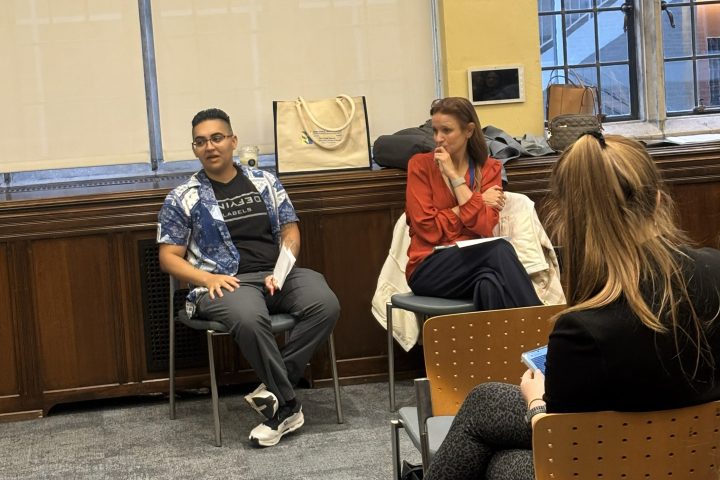Expert Recommendations on Improving Services to Youth Aging Out of Foster Care: Lessons from the Pandemic and Beyond

Last year, I joined a research team at the Field Center to examine the mental health challenges experienced by older youth in and aged out of foster care during COVID-19 and the buffers they employed to regulate their emotions. The study[i], recently published in the Journal of Child and Adolescent Trauma, amplifies the voices of this highly marginalized group of young people regarding their mental health during this challenging time, thus lifting up their perspectives, ideas, experiences, and knowledge.
I am grateful to work at a university-based research center that recognizes the expertise held by individuals with lived experience in the systems that impact their lives. Young people with experience in out-of-home care must be given the opportunity to express themselves and should be involved in the decisions and discussions that shape their future. Systemic reform of the child welfare system related to how it cares for older youth, both during crisis times and in general, will only come about when we hear what these young people need, from the young people.
This study created an important opportunity to not only respond to youths’ needs during the pandemic, but to extrapolate the lessons to improving services across the foster care continuum generally. Following interviews with young adults with lived experience in care – the “Experts” who inform our work – our paper makes six recommendations that I’m thrilled to share here, and explain how these simple ideas can have broad impacts on young people in and aging out of foster care.
Six Recommendations to Improve Services to Youth in and Aging Out of Care:
- Ensure that Youth in Foster Care Develop Relationships with Caring Adults
The presence of a supportive adult is a protective factor for all adolescents, but it can be particularly impactful for those with foster care experience, serving to buffer adverse outcomes. Formal and informal mentors can provide much-needed support to young people in care who may not have the opportunity to develop as many permanent relationships. Enabling older youth in foster care to participate in hobbies and extracurricular activities is another key way that youth can develop relationships with natural mentors.
- Bolster Opportunities for Youth in Foster Care to Develop Developmentally Appropriate Peer Relationships
Youth in foster care are often excluded from traditional adolescent experiences as their needs beyond safety, including opportunities for normal child and adolescent development, take a backseat to the child protection focus of the system. Child welfare staff, foster parents, group homes, and other service providers should ensure that the “Reasonable and Prudent Parent Standard” of the 2014 Preventing Sex Trafficking and Strengthening Families Act is applied so children can participate in age and developmentally appropriate extracurricular, enrichment, cultural, and social activities. Further, all states should adopt – and adhere to – a “Foster Children’s Bill of Rights,” to protect the interests of youth in foster care.
- Increase Access to High Quality Mental Health Services and Therapy
Access to effective mental health care is often limited by long waiting lists, cost, and lack of availability, information, or referral. Youth in foster care may face additional barriers that require creative interventions, such as expanding telehealth for youth who may experience frequent moves, increasing funding for mental health care after youth have exited foster care, and expanding and integrating mental health services directly into the settings and communities where young people can use them.
- Renew, Extend, and Expand Assistance Programs for Youth Aging out of Foster Care
While the pandemic generated a few time-limited federal responses for older youth in and aging out of foster care, it is clear that providing additional resources to young adults during this time of transition would benefit young people nationally. Assistance programs that address housing, education and training vouchers, direct cash assistance, and more could have a profound impact on young people who are exiting foster care.
- Provide Ample Opportunities for Vulnerable Youth to Explore and Utilize Self‑Identified Coping Skills
While some coping skills, like meditation, require no special accommodations, youth in foster care may experience limitations to accessing many other mental health care strategies often identified as helpful. Even for something as simple as reading or spending time with friends, adolescents in foster care should be provided with a library card and reliable access to transportation. Internet access is a non-negotiable in today’s world, and youth in foster care must have this need met by system professionals so they can access social media, TV, and be able to interact with friends and family. Other creative and youth-specific solutions could include purchasing gym memberships and the development of or advocacy for pet-friendly housing options for youth aging out of foster care.
- Promote the Practice of Collaborative Casework with Youth and Expand Access to Extended Foster Care
Child welfare caseworkers should encourage the youth on their caseloads to take advantage of extended care, as each year of continued foster care placement has repeatedly been shown to improve life outcomes across a variety of domains. While available in most states, extended foster care is neither universal nor uniformly administered. All states should implement the federal option to provide extended care to youth until age 21 and provide comprehensive post-transition aftercare supports. Caseworkers should value the input of the youth on their caseloads and be well-versed in resources available to older youth in foster care, and those who have aged out of care, in their local communities.
It is our hope the results of this study and their implications will be used to improve how this country responds to this marginalized group of young people both in times of disaster and in our child welfare system generally. To learn more and read the full paper, “Just being there, like a shoulder to lean on”: Resilience and Mental Health among Older Youth in and Aged out of Foster Care during COVID-19, click here.
________________________________________
[i] Greeson, J. K., Gzesh, S. E., Wasch, S., Jaffee, S. R., & Ciluffo, K. L. (2022). “Just being there, like a shoulder to lean on”: Resilience and Mental Health among Older Youth in and Aged out of Foster Care during COVID-19. Journal of Child & Adolescent Trauma, 1-10.


